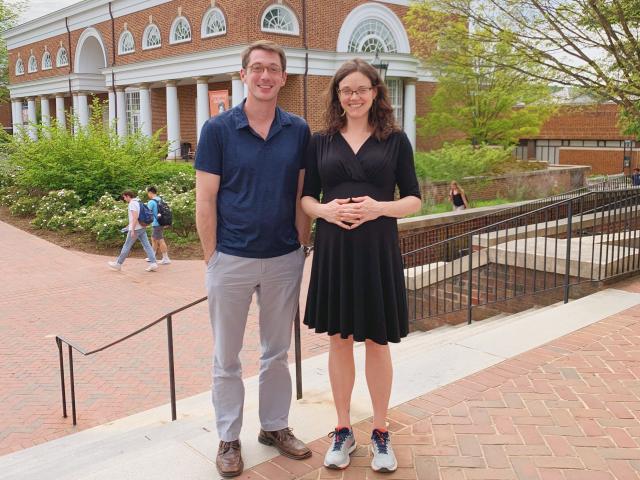Decolonizing the Digital Humanities

Pictured: (Left) Associate Professor of Art History Douglas Fordham; (right) Assistant Professor of Spanish Allison Bigelow
Decolonizing the Digital Humanities
UVA professors Allison Bigelow and Douglas Fordham convened “Decolonizing the Digital Humanities: Indigenous Arts, Histories, and Knowledges from the Material to the Screen” April 5-6, a symposium that assembled artists, scholars, and practitioners to explore questions related to digital humanities approaches in Indigenous Studies and how scholars might be responsive to the analog concerns of the humanists and humans whose lives and cultures are the subject of such approaches. The symposium was timely and pertinent in light of UNESCO’s declaration of 2019 as the “Year of Indigenous Languages.” The purpose of the symposium was “to explore the possibilities and limits of decolonization within the context of Indigenous artworks, histories, and knowledges.” The presentations and sessions at the symposium addressed both infrastructural issues related to DH approaches in Indigenous Studies – for instance mapping and visualization of indigenous communities, as well as intellectual concerns i.e. preserving indigenous languages and formal aspects of indigenous cultural forms and expression.
The morning session of the symposium’s first day focused squarely on the infrastructural side of the “Decolonizing” theme. Entitled “Space, Power, and the Limits of Visualization in Indigenous Communities of the Global South,” the session featured three speakers as follows: María José Afanador-Llach of La Universidad de los Andes (“Digitization, Mapping and the Reconstruction of Erased Indigenous Places”); Kasey Keeler of the University of Wisconsin-Madison (“Mapping Native People: The Intersection of Individual Privacy, Tribal Sovereignty, and Academic Research”); and Kent Morris (CEO, The Torch, Indigenous Arts in Prisons and Community Program).
The afternoon session entitled “Indigenous Media and Forms in Latin America and Latinx Communities” also featured three speakers as follows: Élika Ortega Guzmán of Northeastern University (“Literary mestizajes – Print-Digital Books from Latin America”); Amalia I. Córdova of the Smithsonian Institution (“Indigenous Languages Onscreen: the Smithsonian’s Mother Tongue Film Festival”); and Janet Chávez Santiago of the Fe y Lola Textile Studio (“Innovate to Maintain Tradition: Weaving a Zapotec (Hi)story”). Margaret Bruchac closed the day’s proceedings with a keynote address entitled “Voices Carry: Reflections on Animacy in Indigenous Collections.” The second day of the symposium was devoted to a roundtable and discussion of what steps could be taken to advance digital Indigenous studies based on the proceedings of the symposium. The second day of the symposium was devoted to discussion of the challenges and opportunities that accompany DH approaches. Invited speakers like Margaret Bruchac of the University of Pennsylvania alluded to the ways in which DH methodologies may be at odds with Indigenous communities’ notions of sovereignty, privacy, and intellectual property.
“Decolonizing” co-organizer Allison Bigelow’s own experience as an 18th century Colonial Studies scholar helped spark the symposium. Bigelow, Assistant Professor of Spanish at UVA, notes, “My interest in DH came from graduate students. They wanted a course in DH and we had nothing from indigenous studies. We worked with Rafael Alvarado at DSI [the University of Virginia’s Data Science Institute], [and in the midst of this collaboration] I noticed methodological tensions – [for example] native communities that didn’t want everything documented by outsiders.” She said that her foray into scholarship on indigenous communities came up against issues of sovereignty, representation, and repatriation. Further to that point, co-organizer Douglas Fordham, Associate Professor in the McIntire Department of Art, indicated that the increased visibility digital humanities research sometimes brings to indigenous communities can also entail infringements on these communities’ autonomy among other “unintended consequences.”
The “Decolonizing” symposium was made possible thanks to the funding of the Page-Barbour Foundation, the Buckner W. Clay Endowment at the University of Virginia Institute of Humanities & Global Cultures, the Center for Global Inquiry and Innovation, the Center for the Americas, and the McIntire Department of Art.
